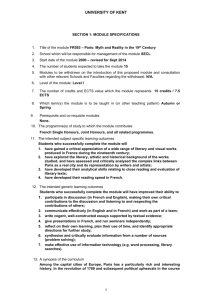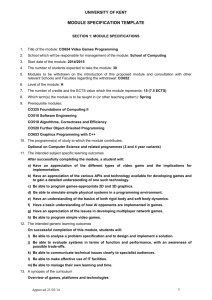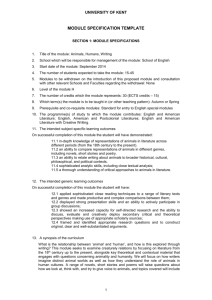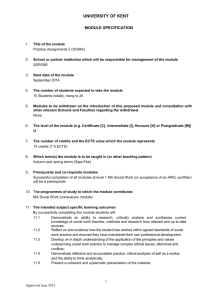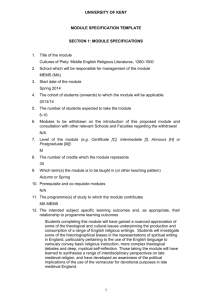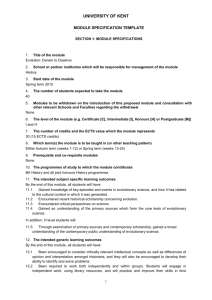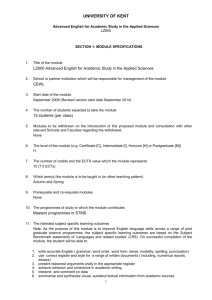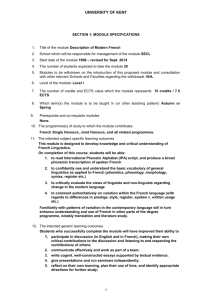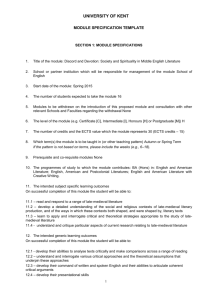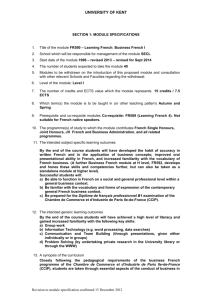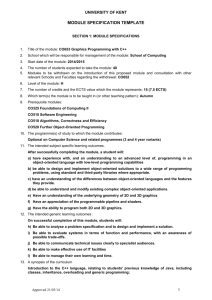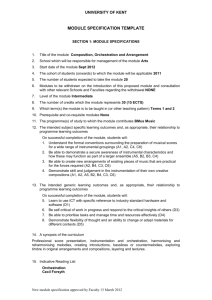section 1: module specifications
advertisement
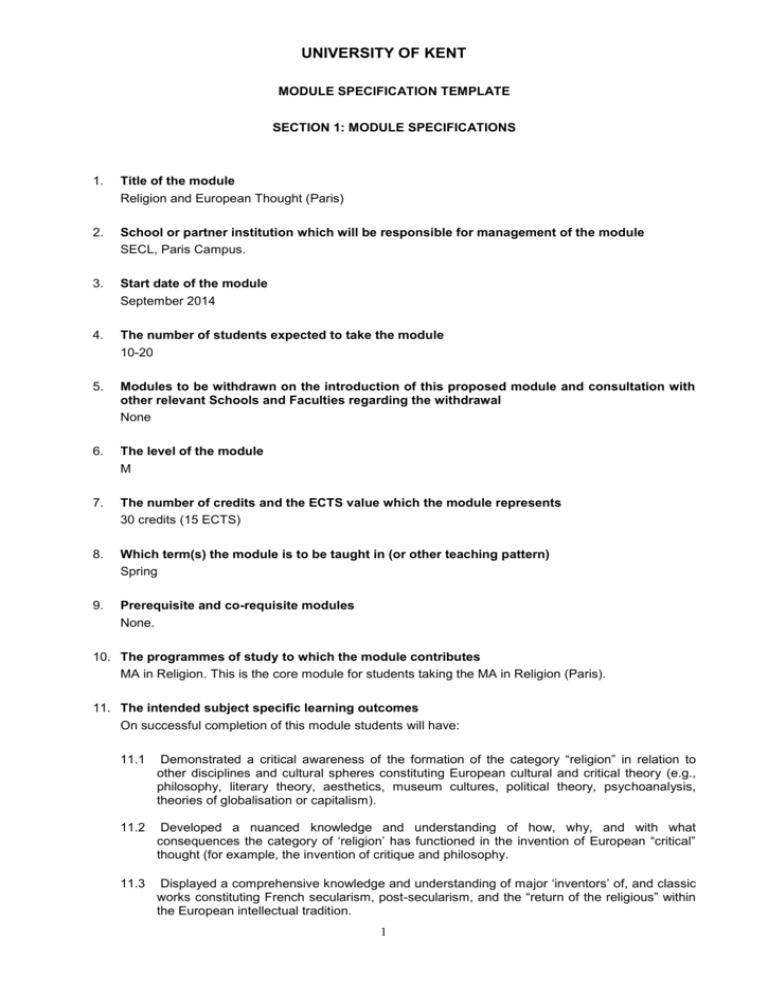
UNIVERSITY OF KENT MODULE SPECIFICATION TEMPLATE SECTION 1: MODULE SPECIFICATIONS 1. Title of the module Religion and European Thought (Paris) 2. School or partner institution which will be responsible for management of the module SECL, Paris Campus. 3. Start date of the module September 2014 4. The number of students expected to take the module 10-20 5. Modules to be withdrawn on the introduction of this proposed module and consultation with other relevant Schools and Faculties regarding the withdrawal None 6. The level of the module M 7. The number of credits and the ECTS value which the module represents 30 credits (15 ECTS) 8. Which term(s) the module is to be taught in (or other teaching pattern) Spring 9. Prerequisite and co-requisite modules None. 10. The programmes of study to which the module contributes MA in Religion. This is the core module for students taking the MA in Religion (Paris). 11. The intended subject specific learning outcomes On successful completion of this module students will have: 11.1 Demonstrated a critical awareness of the formation of the category “religion” in relation to other disciplines and cultural spheres constituting European cultural and critical theory (e.g., philosophy, literary theory, aesthetics, museum cultures, political theory, psychoanalysis, theories of globalisation or capitalism). 11.2 Developed a nuanced knowledge and understanding of how, why, and with what consequences the category of ‘religion’ has functioned in the invention of European “critical” thought (for example, the invention of critique and philosophy. 11.3 Displayed a comprehensive knowledge and understanding of major ‘inventors’ of, and classic works constituting French secularism, post-secularism, and the “return of the religious” within the European intellectual tradition. 1 UNIVERSITY OF KENT 11.4 Critically analysed the political, social, and institutional role of non-European religion in the formation of modern and contemporary European views on culture, politics, and religion. 11.5 Demonstrated the ability to situate one’s own specialist area (e.g. Hindu Studies, Biblical Studies) in relation to the genealogies and questions mapped in this course. 12. The intended generic learning outcomes On successful completion of this module students will have: 12.1 Shown autonomy and self-direction in a) designing and implementing projects and b) decisions about how to apply the wider histories of the discipline to the student’s particular area of study (the exercise of personal initiative and responsibility) 12.2 Analysed competing arguments at an advanced level, and to take positions and to explain and justify those positions (decision-making in complex and unpredictable situations) 12.3 Demonstrated the ability to look at diverse data and to create meaningful larger narratives of the history of ideas, culture, or politics. Collectively and individually, students will be asked to make new stories and, new genealogies of religion in relation to foundational modern concepts (decision-making in complex and unpredictable situations; synthesising data) 13. A synopsis of the curriculum In recent decades European intellectual culture has seen a turn towards the post-secular, the postcritical, the “return” of religion, or, as Claude Lefort described it “the permanency of the theologicopolitical”. Such gestures invite a rethinking of the political, social, and intellectual role of “religion” in the recent history of European thought. Such reworking intimately affects the understanding of Europe within a scene of global political and economic development, European traditions of philosophy, concepts of political autonomy; its critical theories of culture and economy, links between the idea of Europe and democratic political foundations; and the nature of artistic, social, and psychological exploration. This course creates capacities to interact with and to intervene in these important and on-going cultural discussions by developing new maps of “religion” as a central preoccupation in the formation of European intellectual identity, with a strong focus on Paris and the history of religion in “French theory” (e.g the works of Badiou, Benslama, Derrida and Foucault). 14. Indicative Reading List Alain Badiou. The Incident at Antioch, New York: Columbia University Press, 2013. Fethi Benslama. Psychoanalysis and the Challenge of Islam, Minneapolis: University of Minnesota Press, 2009. Dipesh Chakrabarty. Provincializing Europe: Postcolonial Thought and Historical Difference, Princeton NJ: Princeton University Press, 2000. Jacques Derrida. Acts of Religion, London: Routledge, 2002. Michel Foucault & Jeremy Carrette (ed.). Religion and Culture, New York: Routledge, 1999. Marcel Gauchet. The Disenchantment of the World: a Political History of Religion, Princeton NJ: Princeton University Press, 1997. Julia Kristeva. This Incredible Need to Believe, New York: Columbia University Press, 2009. Claude Lefort. Democracy and Political Theory, Cambridge: Polity Press, 1988. Tomoko Masuzawa, The Invention of World Religions, or How European Universalism was Preserved in the Language of Pluralism, Chicago: University of Chicago Press, 2005. Hent de Vries. Political Theologies: Public Religions in a Post-Secular World, New York: Fordham University Press, 2006. Slavoj Zizek. The Fragile Absolute, or, Why is the Christian Legacy Worth Fighting For?, London: Verso, 2nd edn 2009. 2 UNIVERSITY OF KENT 15. Learning and Teaching Methods, including the nature and number of contact hours and the total study hours which will be expected of students, and how these relate to achievement of the intended module learning outcomes Contact hours: 20 contact hours, typically delivered as 2 hour combined seminar/lecture sessions for 10 weeks (with 2 additional reading weeks) In addition each student will come for at least one personal meeting during designated postgraduate office hours. Each two hour session will be a combination of lecture and seminar (student-led group discussion). Total Contact Hours: 20 Number of study hours: 300 These learning and teaching methods will address Learning Outcomes: 11.1-5 and 12.1-3 16. Assessment methods and how these relate to testing achievement of the intended module learning outcomes 100% Coursework One essay of 5000 words. Students are to form their own titles and bibliographies in consultation with the class tutor. The long essay will address learning outcomes 11.1-5 and 12.1-3. 17. Implications for learning resources, including staff, library, IT and space Some additional texts will need to be purchased through the library. Staff from the UKC campus will deliver the module in Paris. 18. The School recognises and has embedded the expectations of current disability equality legislation, and supports students with a declared disability or special educational need in its teaching. Within this module we will make reasonable adjustments wherever necessary, including additional or substitute materials, teaching modes or assessment methods for students who have declared and discussed their learning support needs. Arrangements for students with declared disabilities will be made on an individual basis, in consultation with the University’s disability/dyslexia support service, and specialist support will be provided where needed. 19. Campus(es) where module will be delivered: SECL Paris campus 3 UNIVERSITY OF KENT SECTION 2: MODULE IS PART OF A PROGRAMME OF STUDY IN A UNIVERSITY SCHOOL Statement by the School Director of Learning and Teaching/School Director of Graduate Studies (as appropriate): "I confirm I have been consulted on the above module proposal and have given advice on the correct procedures and required content of module proposals" ................................................................ .............................................. Director of Learning and Teaching/Director of Graduate Studies (delete as applicable) Date ………………………………………………… Print Name Statement by the Head of School: "I confirm that the School has approved the introduction of the module and, where the module is proposed by School staff, will be responsible for its resourcing" ................................................................. .............................................. Head of School Date ……………………………………………………. Print Name SECTION 3: MODULE IS PART OF A PROGRAMME IN A PARTNER COLLEGE OR VALIDATED INSTITUTION (Where the module is proposed by a Partner College/Validated Institution) Statement by the Nominated Officer of the College/Validated Institution (delete as applicable): "I confirm that the College/Validated Institution (delete as applicable) has approved the introduction of the module and will be responsible for its resourcing" ................................................................. .............................................. Nominated Responsible Officer of Partner College/Validated Institution Date …………………………………………………. Print Name ………………………………………………….. Post …………………………………………. Partner College/Validated Institution 4 UNIVERSITY OF KENT Module Specification Template Last updated February 2013 5
